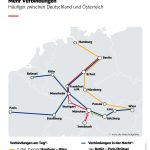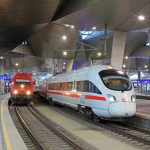 DB and ÖBB agreed to expand their cross-border long-distance services expecting to provide new day and night train connections from December aiming at doubling the number of passengers in Nightjet traffic by 2030.
DB and ÖBB agreed to expand their cross-border long-distance services expecting to provide new day and night train connections from December aiming at doubling the number of passengers in Nightjet traffic by 2030.
“By 2030, we want to double the number of passengers on Nightjet trains. Deutsche Bahn plays an important role since many Nightjet lines begin and end in Germany. The new connections from Berlin to Paris and Brussels and the new generation of Nightjet trains in Germany are sending a strong signal of DB’s and ÖBB’s confidence in night train service and intentions to expand the portfolio,” Sabine Stock, ÖBB Executive Board Member for Passenger Transport said.
With the timetable change in December, there will be another ICE connection between Berlin and Vienna via Nuremberg. Extending the route to Hamburg will also give the major northern German city another daily connection to the Austrian capital. Beginning in December, DB and ÖBB will also be offering an ICE journey from Berlin to Innsbruck and back via Frankfurt and Stuttgart every day, instead of only on weekends. In the future, long-distance trains will connect Munich and Salzburg once an hour and daily trains will connect Innsbruck and Munich every two hours.
To achieve their goal, the national rail companies of Germany and Austria are investing in their fleets. From the timetable change, ICE 4 will be used on the Frankfurt/Main – Munich – Salzburg – Klagenfurt route ensuring greater comfort and reliability on long-distance transport. The new generation of Railjets, which will gradually be introduced on the route between Munich and Italy beginning April 2024, will also provide higher quality and more seats.
Also from December, ÖBB and DB will expand night train services offering Nightjet connections from Berlin and Vienna to Paris and Brussels. These connections will initially run three times a week, and beginning in the fall of 2024, the frequency will increase to daily traffic. This doubles the number of Nightjet connections available in Berlin.
The completely new ÖBB Nightjet trains will be in service for the first time from timetable change 2023/24. They will initially be used on the Hamburg – Vienna and Hamburg – Innsbruck connections. These newly developed Nightjets with speeds of up to 230 km/h offer a new level of comfort, including individual cabins (or mini cabins) in the couchette car and level boarding for people with restricted mobility. Further connections in Austria, Germany and Italy will follow in the course of 2024.
The two companies expect a 40% increase in passenger numbers compared to five years ago.
“More and more people in Germany and Austria are taking the climate-friendly train when they travel to neighboring countries. We want to boost growth even further with new trains, more comfort and convenience, and more connections. This can only be achieved through a joint effort by the rail companies involved. We’re responding to this growing demand by expanding the international timetable in close cooperation with ÖBB,” Stefanie Berk, Member of the DB Fernverkehr Management Board for Marketing said.
ÖBB announced that 33 next-generation Nightjet trains will be operating in Austria, Germany, Italy, Switzerland, and the Netherlands by 2025.
In September 2022, ÖBB and Siemens Mobility unveiled the latest generation of Nightjet couchette and sleeping car tailored to the needs of today’s passengers and offer modern design, enhanced comfort and more privacy. The first of these new trains will operate on popular routes to Italy from both Austria and Germany.
The new generation of Nightjet trains consists of seven carriages, which include two seat cars, three couchettes and two sleeping cars. The total maximum capacity for each one is 254 seats.
Siemens Mobility is also supplying Deutsche Bahn the ICE 4 train fleet. In 2022, the two companies celebrated the delivery of the 100th ICE 4 train and a total fleet of 137 such type train will be delivered by the end of 2024. In 2011, the two companies signed a framework agreement for the supply if up to 300 trainsets with a firm order for 130 ICE 4 trains which have been regular operation since late 2017. These new trains will replace the ICE 1 and ICE 2 fleets. It is expected that ICE 4 trains will be responsible for roughly 70 percent of Deutsche Bahn’s long distance transport revenue.
Share on:







